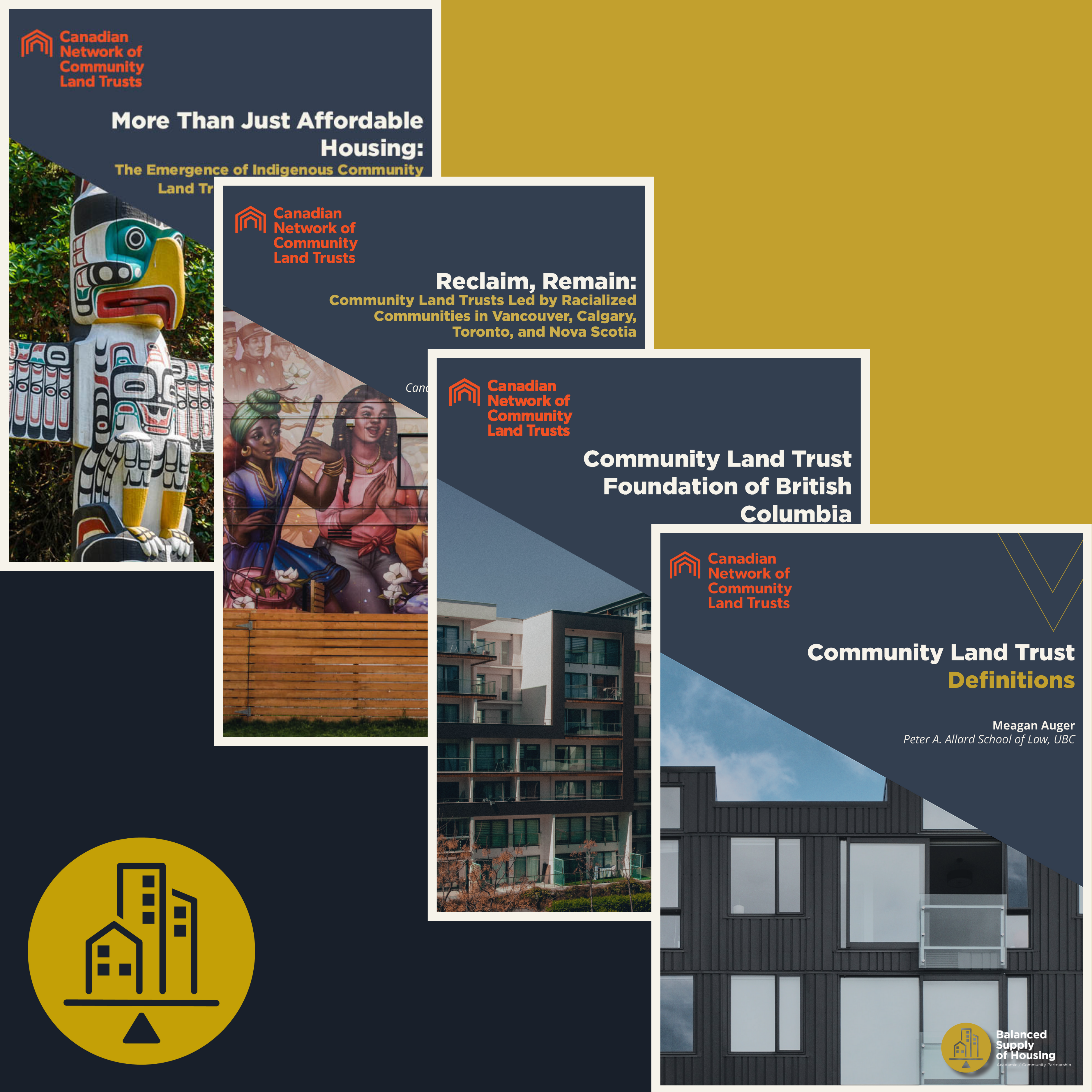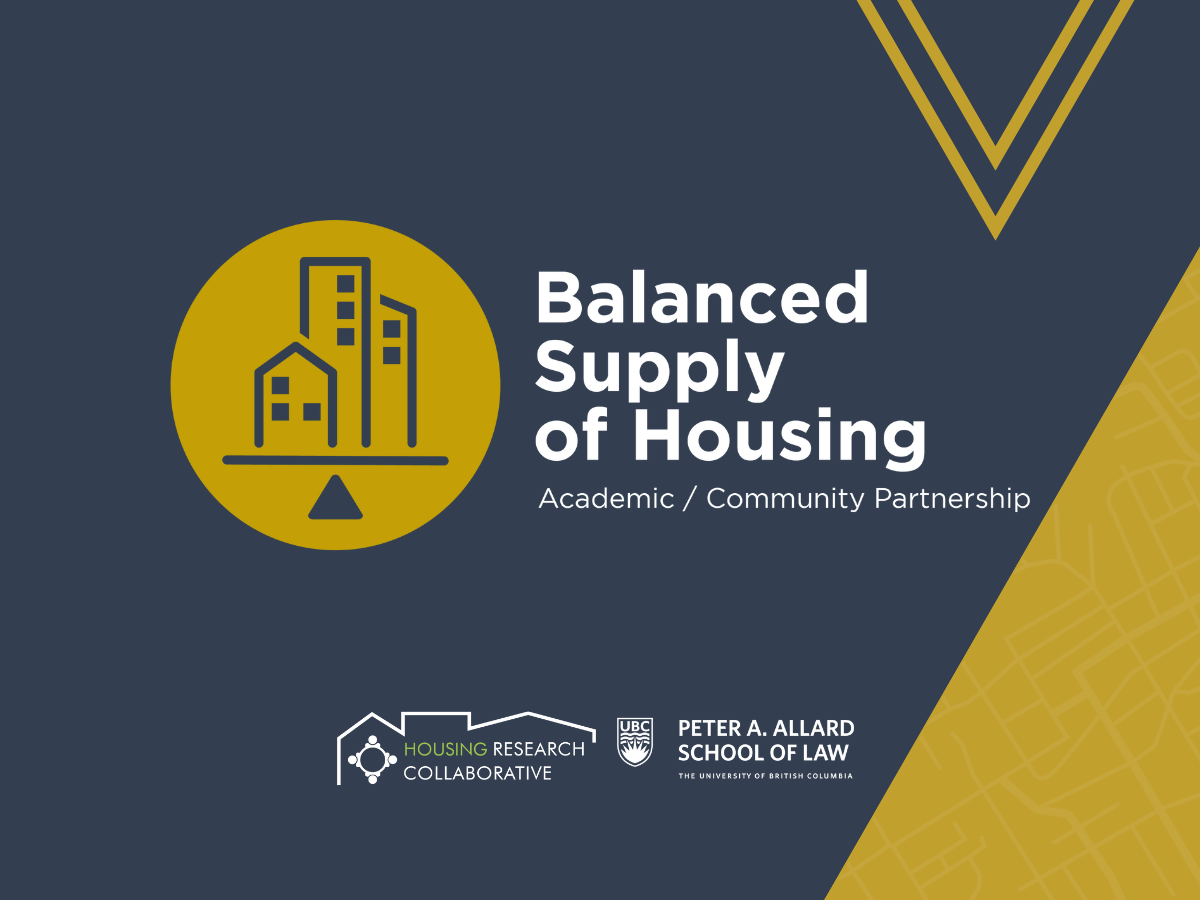Updated March 2025
The Balanced Supply of Housing Research Node, in partnership with the Canadian Network of Community Land Trusts (CNCLT), is excited to announce the release of foundational research papers on Canadian Community Land Trusts (CLTs). Developed in partnership with leading academics and practitioners across Canada, this six-part series is the first of its kind and provides critical insights into the principles, practices, and challenges of CLTs in Canada. With two additional papers anticipated early next year, this comprehensive Policy Report & Profile Series highlights innovative approaches, legal definitions, and strategic pathways for CLT development.
Here’s a look at the recently published papers:
Authors: Nat Pace and Jane O’Brien Davis, Canadian Network of Community Land Trusts
This paper offers an in-depth overview of six BIPOC-led CLTs across Canada. By documenting the early-stage organizing efforts of these projects, “Reclaim, Remain: Community Land Trusts Led by Racialized Communities in Vancouver, Calgary, Toronto, and Nova Scotia” highlights how these community-driven initiatives are forging a path for collective land stewardship. Through practices that prioritize sustainable land use and lasting community ownership, BIPOC-led CLTs are showcasing the potential for resilient and inclusive communities while demonstrating pathways to decolonize land practices and use.
Author: Meagan Auger, J.D.
This paper explores the legal definitions of CLTs globally and evaluates the possibility of establishing a legal framework for CLTs in Canada. By understanding how CLTs are defined in other countries, Auger’s work sheds light on the potential benefits and implications of a Canadian legal definition for CLTs, emphasizing how this formalization could impact the work and mission of these trusts at a local level.
Authors: Margaret Low and Tiana Lewis, School of Regional and Urban Planning, UBC
This report delves into the unique experiences of Indigenous Community Land Trusts (ICLTs) in Canada, documenting both their innovations and challenges. The report not only highlights the ways ICLTs address housing needs but also examines how community land trusts can work toward stronger relationships with Indigenous Nations, organizations, and communities, fostering collaboration and shared purpose.
4. Community Land Trust Foundation of British Columbia (CLTFBC) Case Study
Author: Penny Gurstein, Professor Emeritus, UBC
This case study focuses on the Community Land Trust Foundation of British Columbia (CLTFBC), a Vancouver-based organization utilizing the CLT model to operate housing cooperatives. This case study offers a practical perspective on how CLTFBC’s structure and approach provide secure, community-oriented housing while supporting cooperative principles and affordability for residents.
5. Community Land Trusts in Canada: Responses and Resistance to Gentrification
Authors: Susannah Bunce and Emma Ezvan, School of Cities, University of Toronto
This report explores how CLTs are fighting gentrification and building a more just, community-driven approach to housing and land stewardship. Gentrification has been reshaping Canadian neighbourhoods for decades, driving up housing costs, altering commercial spaces, and displacing working-class communities. While often seen as an inevitable market force, CLTs offer a powerful alternative. By decommodifying land, ensuring long-term affordability, and prioritizing collective ownership, CLTs help resist displacement and preserve community spaces. In Canada, many CLTs have emerged in response to rising development pressures and housing unaffordability, as well as efforts to protect Indigenous and Black communities’ land rights.
What’s Next?
This series will culminate with one final paper:
- “Successful and Promising Use Case Study” by Kuni Kamizaki from the University of British Columbia
This paper will examine critical issues around CLT effectiveness and successful practices, offering further insight into how CLTs can address the housing and affordability crises in Canada.
About the Series
The Policy Report & Profile Series on Community Land Trusts was designed to engage a broad audience, including community members, CLT practitioners, students, policymakers, and academics. Produced in collaboration with the CNCLT, the series aims to ensure that each paper addresses relevant themes to the CLT community while supporting practitioners with evidence-based research and examples.
Without understanding how CLTs work here and abroad, we cannot plan for the future. These papers provide a foundation of literature with which researchers and practitioners can use to develop new models and expand existing models into new communities. We look forward to continuing this important work, spotlighting CLTs as a sustainable and people-centered approach to land and housing.
The Balanced Supply of Housing is a SSHRC-CMHC funded community-based research project at UBC that focuses on land use and housing financialization across Vancouver, Toronto and Montreal.



